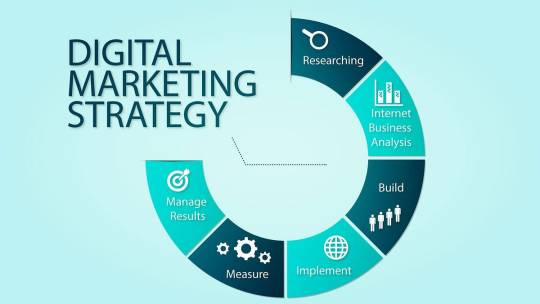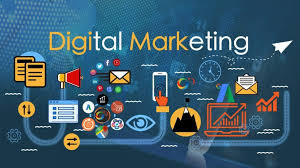Indusfly transforms your digital presence with cutting-edge marketing solutions. From SEO and content creation to social media and paid ads, we drive results and amplify your brand's impact in today’s competitive landscape.https://indusflyservices.com/
Don't wanna be here? Send us removal request.
Text
Drive Your Brand's Success with Effective Digital Marketing

Digital marketing helps brands achieve success by delivering targeted strategies that attract, engage, and convert customers. Through personalized campaigns, content creation, and data-driven insights, businesses can improve brand recognition and customer engagement. Effective execution of these techniques leads to stronger relationships, better lead conversion, and sustainable growth, making digital marketing an essential tool for navigating today’s competitive market landscape.
0 notes
Text
Web Development Strategies for Better Customer Engagement

Engaging customers starts with a strategically developed website. Web development Prioritizing intuitive design, fast loading times, and smooth navigation keeps visitors interested. Features like personalization, interactive elements, and mobile responsiveness create a memorable user experience. By focusing on customer-centric web development, businesses can build lasting connections, enhance brand reputation, and drive conversions. These thoughtful strategies pave the way for meaningful audience engagement and sustained business success.
0 notes
Text
App Development That Powers Business Success

In an increasingly digital world, businesses must adopt innovative solutions to stay competitive and thrive. App development has emerged as a game-changer, empowering companies to streamline operations, improve customer engagement, and unlock new revenue streams. By leveraging custom and thoughtfully developed applications, businesses can achieve unparalleled success and adaptability.
The Strategic Importance of App Development for Businesses
Mobile and web applications are no longer just value-added services—they are essential tools for business growth and operational efficiency. Investing in app development allows businesses to tailor solutions that address their unique needs and challenges.
Enhanced Customer Engagement and Loyalty
One of the key benefits of custom app development is the ability to build stronger relationships with customers. Apps provide a direct communication channel, enabling companies to deliver personalized experiences and engage users more effectively.
Through features such as push notifications, personalized recommendations, and seamless support services, businesses can keep users informed and satisfied. A well-designed app fosters brand loyalty by making interactions with the company convenient and enjoyable.
Operational Efficiency and Process Automation
Custom apps help streamline business processes and improve operational efficiency. By automating repetitive tasks, apps free up valuable time and resources that can be redirected toward strategic initiatives.
Data-Driven Decision Making
Apps are powerful data collection tools. They can track user interactions, gather feedback, and provide insights into customer preferences and behavior patterns. This data can be analyzed to make informed business decisions.
By leveraging analytics tools integrated into custom apps, companies can monitor key performance indicators (KPIs), identify trends, and refine their strategies for greater success.
Scalability and Flexibility
As businesses grow, their needs evolve. Custom apps are designed with scalability in mind, allowing companies to add new features, expand functionalities, and accommodate a growing user base.
This adaptability ensures that the app remains relevant and valuable over time, making it a long-term asset for the business.
Key Features of High-Impact Business Apps
To maximize the benefits of app development, businesses must prioritize features that enhance user experience and operational efficiency. Below are some critical elements to consider:
User-Friendly Interface
A clean, intuitive user interface (UI) ensures that users can navigate the app effortlessly. Simplicity and clarity in design contribute to a positive user experience, increasing engagement and retention rates.
Robust Security Measures
Data security is a top priority for businesses. Custom apps should incorporate robust security protocols to protect sensitive information and maintain user trust.
Cross-Platform Compatibility
To reach a wider audience, apps should be compatible with multiple platforms, including iOS, Android, and web browsers. Cross-platform development ensures a consistent user experience across devices.
Real-Time Updates and Notifications
Timely communication is crucial for keeping users informed. Push notifications and real-time updates help businesses stay connected with their customers and provide essential information when it matters most.
Integration with Existing Systems
Seamless integration with existing business systems, such as CRM and ERP software, ensures that data flows smoothly between different platforms, improving operational efficiency.
The App Development Process: Turning Ideas into Reality
Developing a successful app requires a structured and strategic approach. Below are the key stages involved in the app development process:
1. Discovery and Requirement Gathering
The first step is to understand the business’s objectives, challenges, and target audience. This involves conducting stakeholder interviews, market research, and competitive analysis.
2. Design and Prototyping
Wireframes and prototypes are created to visualize the app’s layout and functionality. This stage allows for user feedback and iterative improvements to ensure a user-centric design.
3. Development and Coding
The development phase involves writing code, integrating features, and building the app’s backend and frontend components. Agile development methodologies are often used to ensure flexibility and continuous improvement.
4. Testing and Quality Assurance
Comprehensive testing is conducted to identify and resolve any bugs or performance issues. This stage ensures that the app meets high-quality standards and provides a seamless user experience.
5. Deployment and Launch
Once the app is fully tested and approved, it is deployed to the intended platforms. A strategic launch plan is implemented to ensure maximum visibility and user adoption.
6. Maintenance and Updates
Ongoing maintenance is essential to keep the app running smoothly and securely. Regular updates are released to add new features, improve performance, and address any issues.
Conclusion
Investing in custom app development gives businesses a competitive edge by enabling them to innovate, adapt, and deliver exceptional experiences to their customers. Companies that leverage custom apps are better positioned to respond to market changes, launch new products, and maintain customer loyalty.
0 notes
Text
Website Development: Building Your Online Presence

Website development plays a crucial role in building your online presence. It involves creating and maintaining a website to showcase your brand, products, or services. A well-developed website ensures a smooth user experience, improves search engine rankings, and helps attract and engage customers. From layout design to content management, every element contributes to establishing credibility and increasing visibility. Investing in professional website development can significantly enhance your business growth and digital footprint.
0 notes
Text
Brand Building Strategies for Long-Term Business Success

Brand building is essential for establishing a lasting connection with customers. By developing a unique identity and delivering consistent brand messaging, businesses can foster loyalty and trust. Long-term strategies include understanding your audience, creating valuable content, and maintaining authentic communication across all platforms. These approaches ensure your brand remains memorable, relevant, and competitive in a dynamic market. With effective brand building, businesses can cultivate lasting relationships and achieve sustainable success.
0 notes
Text
Mobile App Development for Your Business Growth

Mobile app development drives business growth by offering personalized and engaging customer experiences. Custom apps help streamline operations, increase brand visibility, and enhance user engagement. By leveraging advanced technologies, businesses can cater to evolving customer needs and maintain a competitive edge. A well-designed app not only boosts sales but also improves customer loyalty. Investing in mobile app development empowers businesses to stay connected with their audience and achieve scalable growth in today’s digital era.
0 notes
Text
Digital Marketing for Better Engagement and Growth
Digital marketing is a powerful tool for boosting engagement and driving business growth. By leveraging strategies like social media marketing, SEO, email campaigns, and content creation, businesses can connect with their audience more effectively. Digital marketing helps increase brand visibility, build lasting customer relationships, and generate leads. With targeted campaigns and data-driven insights, it empowers businesses to adapt, thrive in competitive markets, and achieve sustainable growth in the digital age.
0 notes
Text
App Development Made Simple for Growing Businesses

In today’s digital-first world, mobile applications have become essential tools for businesses looking to enhance customer engagement, streamline operations, and boost revenue. For growing businesses, the process of App Development might seem complex and overwhelming. However, with the right approach and strategies, it can be simplified and tailored to meet your business needs effectively. Here’s a comprehensive guide to making app development straightforward and impactful for your business.
Understanding the Importance of App Development
Mobile applications have revolutionized how businesses interact with their customers. Here are some reasons why app development is a crucial step for growing businesses:
Enhanced Customer Engagement: Mobile apps provide a direct communication channel to customers, allowing businesses to offer personalized experiences through notifications, promotions, and updates.
Increased Accessibility: Apps offer convenience, enabling users to access your products or services anytime, anywhere.
Brand Visibility: Having an app increases brand awareness and positions your business as innovative and customer-focused.
Data Collection and Insights: Apps allow businesses to gather valuable data on user behavior, preferences, and feedback to improve offerings.
Competitive Edge: In a market where customers expect digital solutions, an app sets your business apart from competitors without one.
Steps to Simplify App Development
The process of creating a mobile app may seem daunting, but following these steps can make it manageable:
1. Define Your Objectives and Goals
Before starting, identify the purpose of the app. Ask yourself:
What problem does the app solve for your customers?
What business goals do you aim to achieve with the app?
How will the app enhance the customer experience?
Clearly defined goals will guide the design and functionality of the app, ensuring it aligns with your business strategy.
2. Research and Plan
Conduct market research to understand your target audience and competitors. This includes:
Audience Analysis: Identify the preferences, challenges, and behaviors of your ideal users.
Competitive Analysis: Study similar apps in the market to identify gaps and opportunities for differentiation.
Create a detailed plan outlining features, user interface (UI) design, and development timelines.
3. Choose the Right Development Approach
There are three main approaches to app development:
Native Apps: Built specifically for a single platform (iOS or Android), offering the best performance and user experience but requiring separate development for each platform.
Cross-Platform Apps: Developed using frameworks like Flutter or React Native, allowing a single codebase for both iOS and Android, reducing development time and cost.
Web Apps: Browser-based apps that adapt to mobile screens, ideal for businesses with limited budgets or simpler needs.
Selecting the right approach depends on your budget, timeline, and desired features.
4. Partner with Experts
For businesses without in-house development expertise, partnering with a reputable app development company or hiring skilled freelancers is a wise investment. Look for developers with experience in creating apps similar to your vision.
5. Focus on User-Centric Design
The app’s design plays a significant role in its success. A user-friendly interface ensures:
Easy navigation and intuitive functionality
Visually appealing layouts
Seamless performance
Collaborate with UI/UX designers to create an app that prioritizes the user experience.
6. Develop an MVP (Minimum Viable Product)
Instead of launching a fully-featured app, start with an MVP—a version with essential features that solves core problems. This allows you to:
Test the app with real users
Gather feedback
Make improvements without incurring unnecessary costs
7. Test Rigorously
Before launching, ensure the app is thoroughly tested for:
Functionality
Performance
Security
Compatibility across devices and platforms
Beta testing with a select group of users can provide valuable insights and help identify any issues.
8. Launch Strategically
A well-planned launch ensures your app reaches the right audience. Promote the app through:
Social media campaigns
Email marketing
Influencer collaborations
App store optimization (ASO) to improve visibility on app marketplaces
9. Monitor and Update Regularly
The journey doesn’t end with the launch. Continuously monitor the app’s performance, track user feedback, and update it with new features and improvements. Regular updates keep users engaged and demonstrate your commitment to enhancing their experience.
Cost-Effective Tips for Growing Businesses
Developing an app doesn’t have to drain your resources. Here are some tips to keep costs manageable:
Use App Builders: Platforms like AppGyver, Adalo, or Glide allow you to create simple apps without coding.
Outsource Strategically: Partner with developers in regions where costs are lower but quality remains high.
Prioritize Features: Focus on essential features initially and add advanced functionalities later.
Leverage Open-Source Tools: Many development tools and frameworks are available for free or at minimal cost.
Conclusion
App development is no longer a luxury but a necessity for growing businesses aiming to stay competitive in a digital world. By clearly defining objectives, prioritizing user-centric design, and strategically planning the development process, businesses can simplify app creation and ensure their app adds value to their operations and customers. With cost-effective strategies and a focus on continuous improvement, your business can harness the power of mobile applications to drive growth, enhance customer satisfaction, and secure long-term success.
0 notes
Text
Mobile App Development to Drive Your Business Forward
Mobile app development is a powerful way to drive your business forward by enhancing customer engagement and streamlining operations. A well-designed mobile app ensures seamless user experiences, boosting customer satisfaction and loyalty. By leveraging cutting-edge technology, businesses can expand their reach, improve brand visibility, and stay ahead in competitive markets. From idea to implementation, mobile app development empowers businesses to connect with their audience and achieve long-term growth in the digital age.
0 notes
Text
Web Development Building Eco-Friendly Websites

Web development plays a crucial role in creating eco-friendly websites that reduce energy consumption and support sustainability. By optimizing server efficiency, implementing lightweight designs, and using green hosting services, developers can minimize a website’s carbon footprint. Eco-friendly websites not only align with environmental values but also attract environmentally-conscious users. Incorporating sustainable practices in web development helps businesses contribute to a greener future while enhancing their online presence and promoting responsible digital innovation.
0 notes
Text
Digital Marketing Strategy to Elevate Your Brand’s Online Presence

Introduction to Digital Marketing Strategy
A well-structured Digital marketing strategy is essential for businesses aiming to increase their online visibility, attract a targeted audience, and drive sustainable growth. In today's competitive market, a comprehensive approach ensures that brands not only reach potential customers but also retain them through value-driven engagement.
Define Your Objectives and Goals
Setting clear, measurable goals is the foundation of any successful Digital marketing strategy. Businesses must identify key performance indicators (KPIs) such as website traffic, conversion rates, and social media engagement. Clear objectives allow for better alignment of marketing efforts with overall business goals.
Understand Your Target Audience
A deep understanding of the target audience ensures that marketing messages resonate with potential customers. Key steps include:
Audience Segmentation: Divide the audience based on demographics, behavior, and interests.
Buyer Personas: Develop detailed profiles representing ideal customers.
Customer Journey Mapping: Understand the stages a customer goes through from awareness to purchase.
Content Marketing: The Heart of Digital Success
Content is central to every digital marketing strategy. High-quality, SEO-optimized content helps brands attract organic traffic and build authority.
Key Elements of Content Marketing:
Blog Posts: Informative articles targeting specific keywords.
Infographics: Visual content for easier information absorption.
Video Marketing: Engaging videos to explain products or services.
E-books and Whitepapers: In-depth resources for lead generation.
Search Engine Optimization (SEO)
SEO is the backbone of effective digital marketing. It involves optimizing your website to rank higher on search engine result pages (SERPs).
On-Page SEO:
Keyword Research: Identify high-ranking keywords.
Meta Tags Optimization: Improve title tags, meta descriptions, and headers.
Image Optimization: Compress and tag images for faster loading.
Off-Page SEO:
Backlink Building: Acquire high-quality backlinks.
Guest Posting: Publish articles on authoritative websites.
Social Sharing: Encourage sharing to boost visibility.
Social Media Marketing
A strong presence on social media platforms expands brand reach and fosters customer relationships.
Key Platforms to Focus On:
Facebook: Community building and targeted ads.
Instagram: Visual storytelling and influencer collaborations.
LinkedIn: B2B networking and thought leadership.
Twitter: Real-time engagement and trending topics.
Social Media Best Practices:
Consistent posting schedule.
Engaging with followers.
Using relevant hashtags.
Email Marketing for Lead Nurturing
Email marketing remains a powerful tool for lead generation and customer retention.
Effective Email Campaigns Include:
Personalized content.
Automated drip campaigns.
Performance analytics.
Pay-Per-Click Advertising (PPC)
PPC campaigns deliver immediate visibility and targeted traffic through platforms like Google Ads and Facebook Ads.
Steps for a Successful PPC Campaign:
Set clear budget limits.
Use precise audience targeting.
A/B test ad creatives.
Analytics and Performance Measurement
Data-driven decisions are key to improving digital marketing strategies.
Tools to Use:
Google Analytics: Track website performance.
SEMRush & Ahrefs: SEO and backlink analysis.
Hootsuite: Social media performance tracking.
Conclusion
Implementing a robust Digital marketing strategy helps brands elevate their online presence, drive traffic, and increase conversions. By focusing on SEO, content marketing, social media, and performance analytics, businesses can achieve long-term success.
0 notes
Text
A Guide to Defining and Powerful Brand Building

In today’s competitive business landscape, Brand building is more crucial than ever. A strong brand not only differentiates your business but also establishes trust, credibility, and emotional connections with your target audience. This comprehensive guide will walk you through the essential steps to define and create a powerful brand that resonates with your customers and drives long-term success.
What Is Brand Building?
Brand building is the process of creating a unique identity for your business. It involves defining who you are, what you stand for, and how you wish to be perceived by your audience. A powerful brand goes beyond logos and taglines; it embodies the values, mission, and promise your business delivers to its customers.
1: Define Your Brand Identity
The foundation of powerful brand building lies in clearly defining your brand identity. This requires a deep understanding of your business and target audience.
Mission and Vision: Define your purpose and long-term aspirations. Your mission explains why your brand exists, while your vision outlines where you aim to be in the future.
Core Values: Identify the principles that guide your business. These values will shape your culture, decision-making, and customer interactions.
Target Audience: Understand who your customers are by conducting market research. Identify their needs, pain points, and preferences. This ensures your brand message resonates effectively.
Unique Value Proposition (UVP): Determine what makes your brand different and why customers should choose you over competitors.
2: Craft Your Brand Elements
Once your identity is defined, focus on creating the visual and verbal elements that communicate your brand to the world.
Logo Design: Your logo is often the first thing customers notice about your brand. It should be simple, memorable, and reflective of your business values.
Color Palette and Typography: Choose colors and fonts that align with your brand’s personality and evoke the desired emotions in your audience.
Brand Voice and Tone: Develop a consistent tone of voice that aligns with your brand’s identity. Whether formal, casual, or conversational, your communication style should reflect your values.
Tagline and Messaging: A strong tagline encapsulates your brand’s essence in a few words. Complement it with consistent messaging across all platforms.
3: Build a Strong Online Presence
In the digital age, a robust online presence is non-negotiable for brand building.
Website Development: Your website serves as your digital storefront. Ensure it is user-friendly, visually appealing, and optimized for search engines.
Social Media Engagement: Identify the platforms where your target audience is most active and maintain a consistent presence. Share valuable, engaging content to build relationships and foster loyalty.
Content Marketing: Leverage blogs, videos, and infographics to establish your brand as an industry authority. Offer solutions to customer pain points and provide educational content.
Search Engine Optimization (SEO): Optimize your digital content to improve visibility in search engine results, driving organic traffic to your website.
4: Foster Emotional Connections
Brands that evoke emotions build stronger relationships with their audience.
Storytelling: Share authentic stories about your brand’s journey, values, and people. Stories humanize your brand and make it relatable.
Customer-Centric Approach: Put your customers at the center of your branding strategy. Listen to their feedback, address their concerns, and exceed their expectations.
Community Engagement: Create opportunities for your customers to engage with your brand. This could include hosting events, building online communities, or launching interactive campaigns.
5: Ensure Consistency Across Channels
Consistency is the key to reinforcing your brand identity and building trust.
Unified Visuals: Use the same logos, colors, and fonts across all marketing materials, from social media posts to packaging.
Coherent Messaging: Align your brand messages across channels. This creates a seamless experience for customers interacting with your brand.
Employee Alignment: Train your team to understand and embody your brand values. Every employee interaction should reinforce your brand identity.
6: Monitor and Evolve Your Brand
Brand building is an ongoing process that requires regular evaluation and adaptation.
Measure Performance: Use tools like Google Analytics, social media insights, and customer surveys to track your brand’s performance. Metrics like brand awareness, customer engagement, and loyalty are crucial indicators.
Adapt to Trends: Stay updated with industry trends and customer preferences. Adapting your strategy ensures your brand remains relevant and competitive.
Refine Your Strategy: Based on insights and feedback, make necessary adjustments to your branding efforts. This could involve redesigning visuals, revising messaging, or exploring new platforms.
Examples of Powerful Branding
Let’s look at a few brands that have mastered the art of brand building:
Apple: Known for its minimalist design, innovative products, and a strong emotional connection with customers, Apple has built a brand synonymous with quality and creativity.
Nike: With its iconic slogan "Just Do It," Nike inspires customers to push their limits. Its consistent branding across products, ads, and social platforms has solidified its position as a leader in sportswear.
Coca-Cola: Coca-Cola’s brand focuses on happiness and togetherness. Its consistent use of the red-and-white logo and memorable campaigns has made it a global household name.
Why Invest in Brand Building?
Building a brand isn’t just about gaining recognition—it’s a long-term investment in your business's success.
Customer Loyalty: A strong brand creates emotional connections that foster customer loyalty and advocacy.
Competitive Edge: A well-defined brand differentiates you from competitors, making it easier to attract and retain customers.
Higher Profit Margins: Customers are often willing to pay a premium for products from trusted brands.
Attracting Talent: A reputable brand attracts skilled professionals who align with your values.
Conclusion
Brand building Defining and building a powerful brand is essential for long-term business success. By following these steps—defining your identity, crafting your elements, building an online presence, fostering connections, ensuring consistency, and evolving your strategy—you can create a brand that not only stands out but also thrives in today’s dynamic marketplace.
0 notes
Text
Increase the Growth of Your Business with Mobile App Solutions

In today’s competitive digital landscape, Mobile app solutions have emerged as powerful tools that drive business growth, streamline operations, and improve customer engagement. With more consumers relying on smartphones and mobile devices, investing in a mobile app is no longer an option but a necessity for businesses looking to stay ahead. Let’s explore how businesses can leverage mobile app solutions to accelerate their growth.
Why Mobile App Solutions Are Crucial for Business Success
The evolution of mobile technology has reshaped how businesses operate and connect with their audiences. Mobile app solutions offer unique opportunities for businesses to reach customers, automate processes, and provide real-time services. Key benefits include:
Enhanced Customer Engagement: Mobile apps allow businesses to interact with customers directly through push notifications, in-app messaging, and personalized content. This constant communication fosters loyalty and improves the overall customer experience.
Increased Accessibility: A mobile app ensures your business is accessible 24/7, allowing customers to interact with your brand anytime, anywhere.
Streamlined Operations: Businesses can integrate automation, optimize workflows, and enhance productivity using custom app solutions.
Benefits of Mobile App Development for Your Business
1. Improved Brand Recognition and Visibility
Having a dedicated mobile app increases your brand’s visibility on app stores and mobile devices. Customers are more likely to recognize your business when your app icon sits prominently on their smartphones. Consistent use of your app reinforces brand recall and loyalty.
2. Enhanced Customer Experience
A well-designed mobile app delivers a seamless and intuitive user experience. With features like easy navigation, fast performance, and personalized recommendations, businesses can meet customer expectations effectively. Apps also offer a platform for direct feedback, helping companies address issues quickly and improve satisfaction.
3. Boosted Sales and Revenue
Mobile apps provide businesses with opportunities to generate revenue through in-app purchases, advertisements, and premium subscriptions. Additionally, apps can facilitate seamless e-commerce experiences, allowing users to browse products, add to cart, and check out with ease. Integrating payment gateways makes transactions smooth and secure, encouraging higher sales conversions.
4. Data Collection and Insights
Mobile apps offer businesses the ability to gather valuable data on user behavior, preferences, and trends. These insights enable companies to make data-driven decisions, personalize offerings, and create targeted marketing strategies that yield higher ROI.
5. Competitive Edge in the Market
Having a mobile app sets businesses apart from competitors who rely solely on websites or offline methods. In today’s fast-paced environment, mobile apps are essential for providing convenience and superior services that customers demand.
Key Features of a Successful Mobile App Solution
To maximize the benefits of mobile app solutions, businesses must focus on incorporating essential features that enhance usability and efficiency.
1. User-Friendly Interface (UI/UX)
A clean and intuitive interface is the foundation of any successful app. Businesses should prioritize a user-centric design to ensure smooth navigation and engagement.
2. Personalization
Modern customers expect tailored experiences. Adding features like personalized recommendations, user preferences, and customized notifications increases user satisfaction and retention.
3. Push Notifications
Push notifications are a powerful way to re-engage users, promote offers, and share important updates. However, businesses must use them wisely to avoid overwhelming users.
4. Offline Functionality
Allowing access to key features offline ensures your app remains valuable even when users lack an internet connection, enhancing usability.
5. Integration with Third-Party Services
To improve functionality, mobile apps should integrate with services like payment gateways, social media platforms, and CRMs. This enhances the user experience and simplifies processes.
Steps to Develop a High-Performing Mobile App
1. Define Your Business Objectives
Identify what you aim to achieve with the app—whether it’s boosting sales, improving customer support, or enhancing user engagement. Clear objectives guide the app development process.
2. Conduct Market Research
Understanding your target audience and competitors is crucial for building an app that meets market demands. Analyze customer pain points and preferences to create a solution that adds value.
3. Choose the Right Technology Stack
Selecting the right technology is key to building a high-performing app. Whether it’s native development (Android or iOS) or cross-platform frameworks like Flutter or React Native, the choice depends on your business needs and budget.
4. Focus on Design and User Experience
The success of an app depends heavily on its design. Work with skilled designers to create an intuitive, visually appealing, and user-friendly interface.
5. Test Rigorously
Testing ensures the app performs well across devices and platforms. Conduct usability, performance, and security testing to identify and resolve any issues before launch.
6. Launch and Monitor Performance
After launching the app, gather user feedback and monitor performance through analytics. Regular updates and improvements are essential to keeping users satisfied and engaged.
Industries Benefiting from Mobile App Solutions
Mobile apps are transforming businesses across industries:
E-commerce: Apps offer seamless shopping experiences with features like personalized recommendations, secure payments, and real-time tracking.
Healthcare: Telemedicine apps provide virtual consultations, appointment scheduling, and patient management solutions.
Finance: Banking apps enable users to perform transactions, check balances, and manage finances from anywhere.
Education: E-learning apps deliver interactive lessons, quizzes, and progress tracking for students.
Travel: Travel apps simplify bookings, itinerary management, and customer support for travelers.
How Mobile App Solutions Drive Business Growth
Businesses that invest in mobile app solutions experience substantial growth in multiple areas:
Customer Loyalty: Apps enable businesses to build long-term relationships with customers through personalized experiences and loyalty programs.
Revenue Growth: Monetization strategies like in-app purchases, ads, and subscriptions drive additional revenue streams.
Operational Efficiency: Custom mobile apps automate tasks, reduce manual errors, and improve overall productivity.
Market Expansion: Mobile apps allow businesses to expand into global markets, reaching new audiences effectively.
Future of Mobile App Solutions
The future of mobile app solutions lies in emerging technologies like Artificial Intelligence (AI), Augmented Reality (AR), and Internet of Things (IoT). AI-powered apps enhance personalization, AR apps revolutionize user experiences, and IoT integration opens new possibilities for smart solutions. Businesses that adopt these technologies will lead the digital transformation and stay ahead of competitors.
Conclusion
Mobile app solutions have become essential for businesses seeking sustainable growth, improved customer engagement, and increased profitability. By investing in well-designed, feature-rich apps, businesses can gain a competitive edge, streamline operations, and expand their reach. Whether you are a startup or an established enterprise, leveraging mobile app technology will help you accelerate success in today’s digital economy.
0 notes
Text
Digital Marketing Adapting to New Technologies

Digital marketing is constantly evolving to adapt to new technologies, transforming how businesses connect with their audiences. Emerging trends like artificial intelligence, voice search, blockchain, and augmented reality are reshaping marketing strategies, enabling personalized experiences and improved engagement. These advancements empower businesses to analyze data more effectively, predict customer behavior, and deliver targeted content across multiple platforms. By embracing innovative tools and staying ahead of technological shifts, digital marketers can ensure their strategies remain impactful, competitive, and aligned with changing consumer preferences.
0 notes
Text
Master App Development Today: Start Creating Now

Master the art of app development and start bringing your ideas to life today! Whether you're a beginner or an experienced developer, this guide provides actionable tips, essential tools, and expert strategies to help you create stunning, high-performing applications. Learn to design user-friendly interfaces, optimize functionality, and ensure your apps stand out in a competitive market. Don’t wait to turn your vision into reality—begin your journey into successful app development now and unleash your creativity like never before!
0 notes
Text
Brand Building Techniques to Outshine Competitors

Stand out in a competitive market with proven brand-building techniques. Establish a unique identity by defining your brand’s mission, values, and voice. Focus on delivering exceptional customer experiences to foster trust and loyalty. Utilize consistent and engaging storytelling across all platforms to connect emotionally with your audience. Leverage social media, influencer partnerships, and content marketing to expand your reach. By combining creativity with strategic planning, you can build a memorable brand that captivates customers and outshines your competitors.
0 notes
Text
Web Development Expertise to Scale Your Business

Web development expertise ensures your business has a website optimized for growth and scalability. With a focus on user experience, responsive design, and advanced functionality, it helps attract and retain customers. Expert web developers integrate essential tools, ensuring seamless performance, e-commerce capabilities, and mobile compatibility. By leveraging cutting-edge technologies, businesses can enhance their online presence, improve engagement, and drive conversions. A professionally developed website is a foundation for scaling operations, building credibility, and achieving long-term success.
0 notes